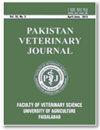鸡源乳酸杆菌抗肠炎沙门氏菌的分离及体外特性研究
IF 5.4
3区 农林科学
Q1 VETERINARY SCIENCES
引用次数: 7
摘要
接收日期:修订日期:接受日期:在线发布日期:2018年11月26日2018年12月31日2019年1月1日2019年01月28日本研究的目的是分离、鉴定和表征具有对抗肠炎沙门氏菌益生菌潜力的新本土乳杆菌菌株。从84个分离的本地家禽来源的乳酸杆菌中,根据其对肠炎沙门氏菌的活性(6.33±0.57-20.33±1.15mm),通过良好扩散测定,预先选择了15个分离株进行体外鉴定。所有预先选择的分离株对酸性pH(2、3和4)具有可变的耐受性。所有分离株在补充有0.3%、1%和1.8%胆汁盐的MRS肉汤中也显示出生长。分离物在2小时内具有不同程度的自聚集(27.05±0.72 65.87±3.12%)和与肠炎沙门氏菌的共聚集(6.33±0.11 55.70±1.32%)。乳酸杆菌的安全性分析表明,IKP23、IKP111和IKP333没有获得性抗生素耐药性。根据益生菌的先决条件,选择IKP 23、IKP 111和IKP 333作为潜在的益生菌,并通过对其部分16S rRNA基因或16S-23S基因间间隔区进行测序,分别鉴定为发酵乳杆菌、发酵乳杆菌和唾液乳杆菌。在共培养实验中,IKP 23、IKP 111和IKP 333对肠炎沙门氏菌的抑制率分别为81%、99.3%和93%。本研究表明,IKP 23、IKP 111和IKP 333具有良好的益生菌潜力,可用于体内研究开发针对肠炎沙门氏菌的益生菌。©2019 PVJ。保留所有权利本文章由计算机程序翻译,如有差异,请以英文原文为准。
Isolation and in vitro Characterization of Anti-Salmonella Enteritidis Probiotic Potential of Indigenous Lactobacilli from Poultry
Received: Revised: Accepted: Published online: November 26, 2018 December 31, 2018 January 01, 2019 January 28, 2019 Aim of the present study was to isolate, identify and characterize new indigenous Lactobacillus strains with probiotic potential against Salmonella Enteritidis. From 84 isolated lactobacilli of indigenous poultry origin, 15 isolates were pre-selected for in vitro characterization on the basis of their activity (6.33±0.57-20.33±1.15 mm) against S. Enteritidis by well diffusion assay. All pre-selected isolates had variable tolerance to acidic pH (2, 3 and 4). All isolates also showed growth in MRS broth supplemented with 0.3, 1 and 1.8% bile salts. Isolates had varying degree of auto-aggregation (27.05±0.72 65.87±3.12%) and co-aggregation with S. Enteritidis (6.33±0.11 55.70±1.32%) within 2 hours. Safety profile of lactobacilli indicated that IKP23, IKP 111 and IKP 333 had no acquired antibiotic resistance. IKP 23, IKP 111 and IKP 333 were selected as potential probiotics on the basis of probiotic prerequisites and identified as L. fermentum, L. fermentum and L. salivarius, respectively by sequencing their partial 16S rRNA gene or 16S-23S intergenic spacer region. IKP 23, IKP 111 and IKP 333 inhibited S. Enteritidis (81, 99.3 and 93%, respectively) in co-culture experiments. This study insinuate that IKP 23, IKP 111 and IKP 333 have favourable probiotic potential and may be used for in vivo studies for the development of probiotics against S. Enteritidis. ©2019 PVJ. All rights reserved
求助全文
通过发布文献求助,成功后即可免费获取论文全文。
去求助
来源期刊

Pakistan Veterinary Journal
兽医-兽医学
CiteScore
4.20
自引率
13.00%
发文量
0
审稿时长
4-8 weeks
期刊介绍:
The Pakistan Veterinary Journal (Pak Vet J), a quarterly publication, is being published regularly since 1981 by the Faculty of Veterinary Science, University of Agriculture, Faisalabad, Pakistan. It publishes original research manuscripts and review articles on health and diseases of animals including its various aspects like pathology, microbiology, pharmacology, parasitology and its treatment. The “Pak Vet J” (www.pvj.com.pk) is included in Science Citation Index Expended and has got 1.217 impact factor in JCR 2017. Among Veterinary Science Journals of the world (136), “Pak Vet J” has been i) ranked at 75th position and ii) placed Q2 in Quartile in Category. The journal is read, abstracted and indexed internationally.
 求助内容:
求助内容: 应助结果提醒方式:
应助结果提醒方式:


